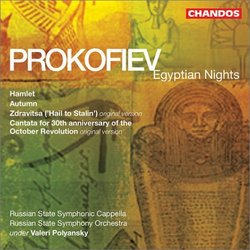| All Artists: Andrei Baturkin, Sergey Prokofiev, Valery Polyansky, Russian State Symphony Orchestra, Tatiana Sharova Title: Prokofiev: Egyptian Nights Members Wishing: 0 Total Copies: 0 Label: Chandos Original Release Date: 1/1/2003 Re-Release Date: 4/22/2003 Genre: Classical Styles: Opera & Classical Vocal, Forms & Genres, Theatrical, Incidental & Program Music, Historical Periods, Modern, 20th, & 21st Century, Symphonies Number of Discs: 1 SwapaCD Credits: 1 UPC: 095115105627 |
Search - Andrei Baturkin, Sergey Prokofiev, Valery Polyansky :: Prokofiev: Egyptian Nights
 | Andrei Baturkin, Sergey Prokofiev, Valery Polyansky Prokofiev: Egyptian Nights Genre: Classical
|
Larger Image |
CD Details |
CD ReviewsInteresting disk of (mostly) second drawer Prokofiev Peter Hoogenboom | New Zealand | 10/05/2007 (4 out of 5 stars) "This disk is a must have for all Prokofiev fans even though it features some of his less inspired music. There are a number of highlights. The music to "Hamlet" is Prokofiev at his most inspired and worth the price of the disk. The opulent cantata "Hail to Stalin" (1939) is also interesting and contains one of Prokofiev's most memorable melodies. Only someone as great as Prokofiev could write a piece of such quality to such a banal text dedicated to such an evil subject. The other propoganda piece on the disk "Flourish, Mightly Land" (1947) is also worth listening to. The other pieces "Autumnal" and "Egyptian Nights" are second drawer Prokofiev, but not without merits. The works are all given committed performances by the Russian performers and are well recorded." What a bizarre collection of works! Russ | Richmond, VA | 07/30/2006 (4 out of 5 stars) "The Soviet composer Sergei Prokofiev wrote some of the most interesting music of the twentieth century. Despite his mood, the voice of Prokofiev is probably one of the most identifiable of any classical composer. If you were to classify Prokofiev's works, there would be a category of well known works, including Romeo & Juliet, Lieutenant Kije and the classical symphony. A second category would contain lesser known works, such as Cinderella and the Scythian Suite. Continuing on like this for three or four more categories you would eventually get to the rarities presented on this disc. Opening the program is "Zdravista" (Hail to Stalin), scored for chorus and orchestra, commemorating the leader's sixtieth birthday. With such a topic, any live performance of this work would constitute a "concert foul" at the very least. That's too bad though, as this is a very interesting piece. As it turns out, Prokofiev could not help himself, and cranked out some good and tuneful music despite this dubious occasion. The piece opens with a beautiful melody that brings to mind the balcony scene from Romeo & Juliet. Following this, the music picks up pace markedly. It has been commented that the pace is so brisk here that the listener is unable to discern what the chorus is actually saying (primarily praises of Stalin) without the aid of text! The music does slow down, and the melodic material of the opening returns, whenever the text focuses on the "cherry orchards" and the "shining dew-drops of the roses" that was the land of the Soviet Union. The music concludes with over the top fortissimo chords. Interestingly, it sounds as if one trumpet player slightly cracks the last note, because he or she is trying to play too loud. But, this is a very fitting ending to such a work. Also included on this program are two incidental music suites: "Egyptian Nights" and "Hamlet." The seven movement "Egyptian Nights" suite is unlike any other Prokofiev piece I know. It's not particularly melodic, but contains distinctive orchestration featuring many percussion instruments and a saxophone. The most notable movement is the finale, "Roma militaris," a depiction of Roman war march. But I think the opening and conclusion of this movement are just too nasty for the piece to be enjoyable. "Hamlet" is written in a similar style to "Egyptian Nights." It should be noted that some of Hamlet's suite movements are purely orchestral, while others contain a part for a solo soprano or bass. Some of the movements featuring the soprano are quite lovely in their simplicity ("Ophelia's Song" Track 7, for instance). The final movement, "Fortinbras's Final March," is also enjoyable for its bizarre harmonies that only Prokofiev could have conceived. This disc also contains an eight minute cantata ("Flourish, Mighty Land") celebrating the thirtieth anniversary of the October Revolution. Similar to "Zdravista" you will probably want to ignore the text on this one. Nevertheless, the cantata is tuneful and accessible, but doesn't reach the heights of "Zdravista." Also, included on this program is the dark and moody "Autumnal" symphonic sketch. This piece is far better known in comparison to the other pieces on this program. "Autumnal" was probably influenced by Rachmaninov's "Isle of the Dead" and sounds similar to that work. If you are a Prokofiev fan and don't have "Autumnal" you should find a copy to pick up. The performance on this CD is good, but you may find stronger couplings elsewhere. In conclusion, the performances here are good, but the majority of this material is for Prokofiev completists. The theater suites are interesting, but are not among Prokofiev's strongest works. The melodic material of "Zdravista" on the other hand is very attractive, but just don't read the text. 73:18" Smartly Compiled, yet... Have Heard It | Chicago, IL | 01/22/2004 (2 out of 5 stars) "A true Prokofiev aficionado will find Rozhdestvensky's rendition of the EGYPTIAN NIGHTS, op.61 - made with the Leningrad Philharmonic, when Mravinsky was still alive(!) - much more inspired. Listed at:http://www.prokofiev.org/recording/album.cfm?aid=000726,it originally appeared on a Soviet MELODIYA/MEZHDUNARODNAYA KNIGA LP (33 D-010331-2), but unlike the ON THE DNIEPER suite, op.51, the masterpiece in question has never been transferred to a CD."
|

 Track Listings (20) - Disc #1
Track Listings (20) - Disc #1